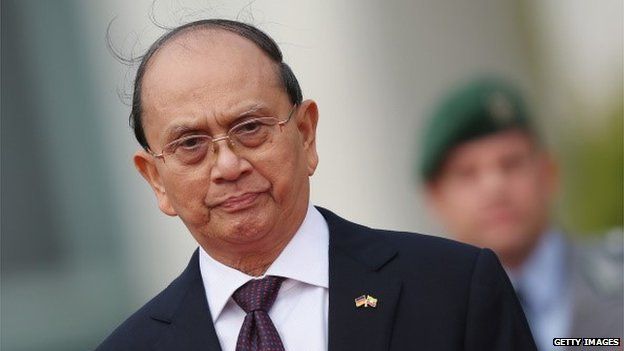Myanmar army and rebels sign draft ceasefire agreement
- Published

Myanmar's President Thein Sein has witnessed the signing of a draft ceasefire agreement between the government and 16 rebel groups.
The agreement, which came after seven rounds of talks, is a significant step towards ending decades of conflict.
Negotiators from the armed rebel groups still have to consult with their leaders before giving final approval.
Rebels from the newest and most active conflict in Kokang did not attend the talks.
The United Nations said the move was a "historic and significant achievement" and provided a basis for "genuine and lasting peace in the country".
'People need peace'
Myanmar has been engaged in armed conflict with various ethnic rebel groups seeking greater autonomy since independence from the British in 1948.
While many have come into the political fold for peace deals, sporadic outbreaks of violence have continued.
All but two of the ethnic armed groups at the talks already have bilateral ceasefires in place.
"The people need peace, they desire peace and they expect peace," Thein Sein was reported by AFP as saying to negotiators on Tuesday.
He added that a full agreement could be signed in months. "After that is signed, the road is open for political dialogue. This action will ensure the peace-builders a place in Myanmar's history," he said.
The BBC's Jonah Fisher says one representative from the armed groups told him on Monday that the government had compromised significantly at the last moment to make a deal possible.
Our correspondent says the idea is to bring all the rebels into a process that will lead on to talks on greater devolution of power and resources - something that the Burmese government has always fiercely resisted.
At talks in Yangon the final four points of contention were resolved. There will be a halt to recruitment by the armed groups, their territory and status were confirmed, as was the nature and composition of the political dialogue that will follow.
The negotiators are now taking the text back to their groups for approval. There will then be a meeting which may lead to a signing.
Meanwhile there is still heavy fighting in the Kokang region and there are still regular clashes in other areas.
The government declared a state of emergency in February as tens of thousands of refugees have been forced to flee their homes, some of them crossing the border into China.
Naing Han Tha, who led the ethnic group negotiators for the ceasefire agreement, told AFP news agency that they planned to discuss the Kokang conflict in future dialogues.
- Published20 March 2015
- Published16 March 2015
- Published17 February 2015